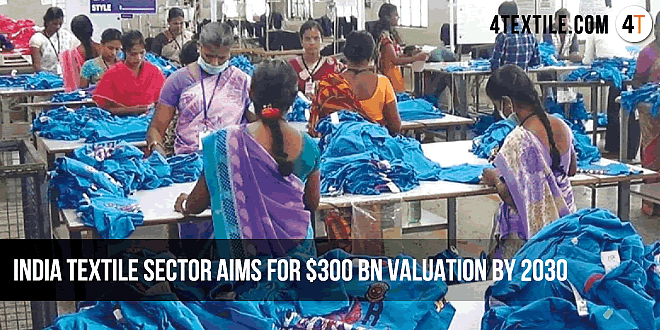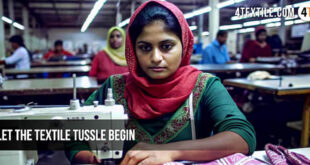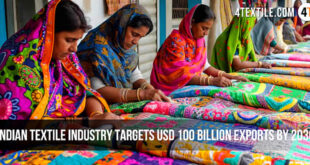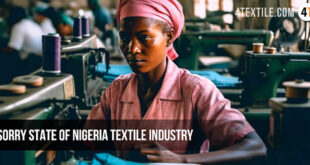Adopting eco-friendly methods such using biodegradable materials and energy-saving devices, Indian textile industry aims for a transition towards a more sustainable industry
India Textile Sector Aims For $300 Bn Valuation By 2030
India textile sector, a major contributor to the Indian economy, is heading towards a greener future in light of the worrying carbon footprint left by the global textile industry, which accounts for around 10 percent of global carbon emissions. As a major employer and exporter, the textile business is aiming to balance economic expansion with a vision to safeguard the environment and its elements.
The textile business is currently valued at USD 175 billion, including exports of 38 to 40 billion dollars and aspires to reach USD 300 billion by 2030, this transition is all about inculcating sustainable practices such as employing biodegradable materials and implementing energy-efficient technologies in the sector’s operations.
While speaking at an Assocham in New Delhi, experts talked about the infusion of sustainability as a concept in the textile industry of India. “Our ambition is not only to make India a hub for sustainable textiles but also to inspire a global movement towards a more responsible industry,” said Pabitra Margherita, Minister of State, Ministry of Textiles, Government of India.
Margherita highlighted the necessity to integrate the textile industry’s expansion with social responsibility and economic inclusiveness to create a future in which India not only drives economic growth but also establishes new sustainability standards, serving as a model for responsible and equitable development.
Government Initiatives
Margherita also touched upon the Ministry of Textiles’ initiatives aimed at embedding sustainability across the textile value chain. These initiatives include the establishment of an environmental, social, and governance (ESG) task force, the promotion of eco-friendly practices, garment recycling and the development of biodegradable textile materials.
The minister pointed out certain policy interventions, such as the production linked incentive (PLI) scheme, PM Mega Integrated Textile Region and Apparel (PM Mitra) parks and the National Technical Textile Mission (NTTM).
Future Aspirations
Taking ahead the conversation, Rohit Kansal, Additional Secretary, Ministry of Textiles, Government of India, discussed the growth potential of India’s textile industry. He shared that the sector is currently valued at USD 175 billion, with exports accounting for USD 38 to 40 billion. By 2030, the industry aims to reach a valuation of USD 300 billion, with USD 100 billion generated from exports.
Consistent growth at a compound annual growth rate (CAGR) of 8 per cent in the domestic textile sector, digitisation, automation and the integration of artificial intelligence were identified as four major trends driving this growth.
“Textile waste is the third-largest contributor to municipal waste,” Kansal continued, “circular economic practices are essential to transforming the textile industry into a sustainability hotspot.” He further said that the textile clusters must collaborate as ecosystems, and MSMEs should embrace advanced technologies from larger corporations.
Technological Integration
M S Dadu, Chairman Assocham Textiles and Technical Textiles Council and Chairman of Colorjet Group, began the summit by stating India’s zeal to use a sustainable textile value chain to balance growth with the environment, “By embracing cutting-edge technologies like waterless dyeing, digital processing and energy-efficient garments, we are setting a global standard for innovation that respects our planet,” he mentioned.
Milind Hardikar, Co-chairman Assocham Textiles said, “With a strong commitment to ESG principles, the textile sector is at a turning point,” Milind continued, “The industry is concentrating on making sure that risk management and reporting adhere to due diligence, which is supported by laws that encourage textile culture and the circular economy.”
Throwing some light on India’s role in sustainable textiles, Ajay Sardana, Co-Chairman Assocham Textiles and Technical Textiles Council and President of Polyester at Reliance Industries, said, “93 per cent of PET bottles in India are recycled into premium recycled polyester garments.” Sardana pointed out the industry’s efforts in fabric-to-fibre recycling and the establishment of a reverse mechanism, further propelled by government incentive schemes.
 4Textile.com World Textile & Apparel Industry Events, News
4Textile.com World Textile & Apparel Industry Events, News







